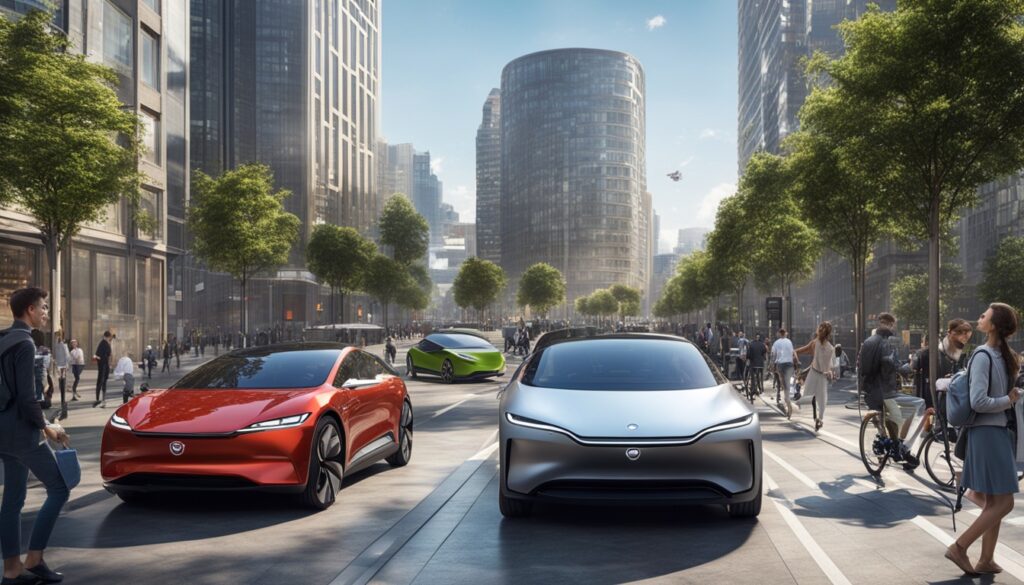Table of Contents
The interest in electric vehicles (EVs) is growing fast. More people and companies see them as a way to travel sustainably. For EVs to become popular, we need good places to charge them. Mixing our charging spots with smart technology gives us a chance to shape the future of how we move.
This smart technology uses advanced tools like artificial intelligence and data analysis. We’ve already seen it change energy, healthcare, and city planning. When we add it to EV charging, we could enjoy many new advantages. It’s a step towards a greener, better world for tomorrow.
What Are Smart EV Chargers?
Smart EV chargers have changed how we see EV charging. They use advanced tech to offer a better way to charge. Unlike the old systems, these chargers think for themselves.
What’s different about smart chargers? They do more than just power up EVs. They can talk to other devices and share info. This lets them manage charging better.
Smart chargers include many parts that work together. They connect the charger, car, and network. Plus, they have sensors that look at the charging status in real time.
Algorithms are key to how smart chargers work. They use data to charge smartly, to save energy and protect the power grid. This means you can charge efficiently without worrying about power problems.
Today, many big names offer smart chargers. Brands include Tesla, Volkswagen, and Siemens. There are also new EV charger companies like ChargePoint and EVBox with exciting new tech.
Smart chargers bring a lot of benefits. They let you charge faster and cut down on wasted energy. This saves money and is good for the planet. You also get to enjoy cool features like monitoring your charge from afar and setting up your charger just how you like it.
Thanks to smart tech, charging your EV is now easier and better. Smart chargers are all about making EVs more user-friendly and eco-friendly.
Technological Innovations in Smart EV Charging Systems
Smart technology is advancing quickly, changing how smart EV charging systems work. These changes are making EV charging infrastructure much better. We now have faster charging, better connection between systems, and it’s easier to fit into our power systems.
The key to these changes is using artificial intelligence (AI) and learning algorithms. These smart systems guess the amount of power needed by looking at data. This means electric cars charge better and are more reliable.
One cool thing is bi-directional charging. It lets electric cars share power with the grid. Cars can give power back, not just take it. This could turn cars into energy stores, helping the power network stay stable.
There’s also wireless charging. You don’t need wires. It uses special fields to give power to cars. This makes charging much easier and without the hassle of cables.
Vehicle-to-grid (V2G) integration is a new idea, too. With this, cars can use their power to help at peak times. This way, we put less stress on the power network and use energy smarter.
Big names like Tesla and BMW are leading the way in making these technologies real. They use clever energy management and the latest data tools for better charging.
It’s super important to keep researching and creating new solutions in EV charging. We’re making charging faster and more connected. This is key for more people to use electric cars. It’s all towards a future of easy, sustainable travel.
| Innovation | Description | Examples |
|---|---|---|
| Bi-directional Charging | Allows electric vehicles to return stored energy back to the grid, contributing to grid stability and resilience. | Nissan Leaf’s Vehicle-to-Home (V2H) system |
| Wireless Charging | Eliminates the need for physical cables and connectors, offering convenient and hassle-free charging experiences. | WiTricity’s wireless charging technology |
| Vehicle-to-Grid Integration | Enables electric vehicles to power homes or offices during peak demand periods, reducing strain on the grid and promoting energy sustainability. | OVO’s VCharge system |
Benefits of Smart Technology in EV Chargers
Introducing smart technology into EV chargers brings several advantages. It helps individuals and communities move towards better, eco-friendly transport. Smart chargers make charging easy, use energy better, and help the Earth.
Smart tech lets users control their charging from anywhere. You can check and adjust your charging from your phone. This means you can set how you charge to fit your needs, making it simple and flexible.
Smart chargers also do a lot for the environment. They cut down on harmful emissions, clean the air we breathe, and save energy. With clever algorithms, they use power wisely. By doing this, they help reduce the impact on our planet and encourage green energy use.
These smart chargers support the growth of smart cities. They fit well with other smart systems in the city. This makes electric cars a better choice for getting around, easing traffic, and making city life smoother.
Examples from Tesla and ChargePoint show us the power of smart tech in charging. They offer solutions that make charging easier and more efficient. Their success points to a future where smart charging benefits everyone and the planet.

When we add smart technology to EV chargers, we win in many ways. It makes using electric cars better, saves energy, and helps our cities become smarter. Smart charging is a key part of a better future for how we move around.
Key Challenges in Smart EV Charger Implementation
Implementing smart EV chargers faces a few key hurdles. To work well with current setups and have the biggest impact, we must tackle these issues. They include:
- Cost: Setting up and keeping smart EV chargers running isn’t cheap. High costs can slow down how fast they spread. Finding ways to lower costs is key to making them available to more people.
- Infrastructure Development: The number and reach of EV charging spots are crucial for smart chargers to flourish. More charging places and a bigger network are needed as more EVs come into use. This ensures charging is easy and available.
- Energy Management: Keeping track of how much energy is used and spreading it out wisely is very important. It helps smart systems work at their best. Smart strategies and working closely with energy grids are vital. They make sure the grid isn’t overwhelmed and can handle everyone’s charging needs.
- Standardization: Smart chargers from different brands and places might not talk to each other easily. This is because there are no global rules on how they should work. Making rules that all smart chargers follow ensures they work well together. It makes sure they mix and match without trouble.
But there are ways to solve these problems. This will help make smart EV chargers a success. Here are a few solutions:
- Public-Private Partnerships: When the government, companies, and charging providers come together, good things happen. They can share the cost and effort, making the charging network better and faster for everyone.
- Government Incentives: Offering help like money, tax breaks, or discounts to those setting up smart chargers is smart. It makes starting out cheaper and encourages more people to go electric.
- Investment in Charging Infrastructure: Keeping up the efforts to build more charging spots, both for the public and private ones, is vital. More stations and better tech mean easier charging for all EV drivers.
- Effective Energy Management Strategies: Using smart strategies to charge EVs helps a lot. This kind of tech can pick the best times to charge, use more clean energy, and do it all without straining the power supply.
- Industry Collaboration and Standardization: For smart chargers to grow, everyone making, installing, and using them must agree on how things are done. One set of rules and a shared plan make it simpler and more attractive for everyone to use smart chargers.
- Stakeholder Engagement and Public Awareness: All the people involved in the EV world, from drivers to energy providers and the public, need to work together. Sharing the good about smart charging, clearing up worries, and highlighting the perks of going green helps get everyone onboard.
By facing these challenges head-on and following these strategies, smart EV chargers can lead to a better, more energy-friendly way to drive.
Future Trends: The Evolution of EV Charging in the Smart Technology Era
The world is moving towards electric vehicles (EVs) for sustainable transport. The future of EV charging looks bright, thanks to smart technology. This tech will make charging your EV quick and easy.
As smart tech gets better, more people will choose EVs. This will lead to a need for better charging spots. New ideas will make these EV stations more innovative.
One big change will be ultra-fast charging. It will make refuelling your EV quick and easy. This change can make owning an EV more practical than ever.
Then, there’s dynamic wireless charging. It will let EVs charge while on the move. This idea makes charging simpler and feels like the future.
Vehicle-to-Everything (V2X) tech is another game-changer. It allows EVs to share power with the grid or other devices. This can make our energy systems more efficient.
Smart grids and renewable energy are also key. They will help EVs charge based on when energy is cleaner and cheaper. Using green energy for charging is a huge step towards a more ecological world.

Image depicting the future trends of EV charging in the smart technology era.
Experts are optimistic about EV charging’s future. With more research and tech, charging will be faster and easier. This will make having an EV more practical for everyone.
But, we must tackle some challenges. For EV charging technology to grow, it should be easy to use, work with other systems, and grow. This needs everyone involved to work together.
In the end, the future of EV charging is full of possibilities. With smart tech and new ideas, we’re heading towards a brighter, greener future of transport. This journey will help our cities become smarter and more sustainable.
Conclusion
Bringing EV charging and smart tech together opens big doors for green travelling. We’ve looked at the pluses and hurdles facing this move.
Smart technology and EV chargers work as a team. They cut down on pollution, boost city life, and make everything more efficient. These chargers make using them easier and help more homes use less power.
But, challenges like making enough charging spots and managing power smarter wait. We need everyone to help out, from businesses to the government, by sharing ideas and pushing tech forward.
The future looks bright for EV charging. New smart tech like AI and better ways to share power will make charging even quicker and tie in better with our power systems. With more people wanting to go green and cities getting smarter, we’re set to see big changes in how we charge our cars.
For us to really win with EVs and smart tech, we need to keep learning, working together, and finding new ways to charge. Investing in smart infrastructure and ways to use power smarter is key. It’s how we’ll lead to a cleaner, brighter world.
FAQ
What are smart EV chargers?
Smart EV chargers use clever technology. This includes sensors and software. They can talk to other devices and make charging your electric vehicle easy and efficient.
How do smart EV chargers differ from traditional charging systems?
Smart EV chargers can talk to other devices. They use data to charge your vehicle better, making it faster and more efficient. This means a better experience for you.
What are some examples of smart EV charger manufacturers and innovative companies in the EV charging industry?
DC fast charger manufacturers: Tesla, ChargePoint, and EVBox are well-known for their smart EV chargers. Then there’s Greenlots, Blink Charging, and ABB, who are also leaders in EV charging technology.
What are the benefits of using smart EV chargers?
Smart EV chargers make charging faster and more efficient. They help reduce emissions and improve air quality. Plus, they make charging your EV a better experience.
What are the latest technological advancements in smart EV charging systems?
Charging speed, how well different chargers work together, and connecting to the power grid are all getting better. AI and machine learning also help manage energy smarter and predict the future needs better.
What are some innovations in EV charging technology?
Exciting innovations include charging both ways, without cables, and linking your car to the power grid. With bi-directional charging, cars can give power back. And wireless charging gets rid of cables.
Who are the key players driving technological innovations in smart EV charging systems?
Leading the charge are companies like Tesla, ChargePoint, and ABB. Research groups, startups, and governments are playing significant roles too. They’re all pushing EV charging tech forward.
What role does smart technology play in EV charging infrastructure?
Smart tech is vital in making EV charging better and promoting sustainable travel. It helps manage energy well and makes charging easier for everyone. This contributes to making cities smarter too.
What are some challenges in the implementation of smart EV chargers?
Setting up smart EV chargers is hard because it costs a lot and needs new ways to manage energy. Standards and building the right infrastructure are also challenges we face. But, working together can help solve these problems.
How can these challenges be overcome?
We need everyone to work together to solve these problems. This means public and private groups teaming up. Governments need to give support too. This helps make sure we have enough chargers for everyone.
What are the future trends in EV charging infrastructure?
The future will see charging that’s faster and wirelessly connected. We’ll also see more ways your car can use power and give power back. This all depends on smart grids and using green energy more.
What is the potential for growth in the EV charging industry?
More electric cars mean we need a lot more charging places. Technology and a focus on the environment will drive this growth. This is very exciting for the EV charging industry.
How can smart technology contribute to sustainable transportation?
Smart tech manages energy better and uses more renewable sources. This cuts down on pollution and makes driving electric cars easier. It’s all about making our travel cleaner and greener.
What are some real-world examples of the positive impact of smart technology in EV charging infrastructure?
Look at smart cities with smart charging networks. These use the most energy-efficient methods. They also use AI to use power in the best way. It’s all about being clean and smart.
How important is industry collaboration for the successful implementation of smart EV chargers?
Working together is key to making smart EV chargers work. This includes the government, companies, and those who provide power. By working as a team, we can use energy well and make smart charging work for everyone.
What is the role of research and development in shaping the future of EV charging infrastructure?
R&D helps us create new and better ways to charge electric vehicles. It’s about finding smarter and more affordable solutions. This is how we keep improving EV charging technology.
How can EV charging infrastructure be integrated with smart technology to maximize benefits?
Mixing EV charging with smart tech makes everything work better. It saves energy and makes charging more user-friendly. This also helps make our cities and ways we travel cleaner and smarter.
Source Links
- https://www.linkedin.com/pulse/electric-vehicle-charging-infrastructure-challenges-chaehoon-lee
- https://www.mdpi.com/1996-1073/16/14/5274
- https://www.mdpi.com/2032-6653/14/9/259









